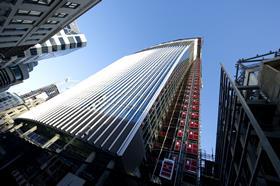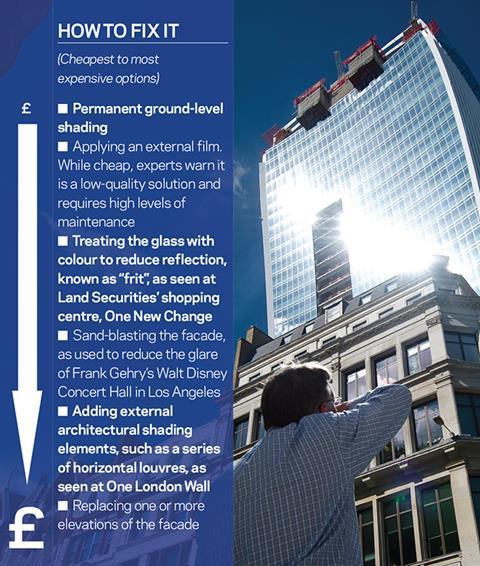Canary Wharf Group says cost of solution for solar glare problem on City tower likey to be in the “low single digit millions”

The long-term fix to the Walkie Talkie’s heat ray is not likely to cost more than “low single digit millions”, with the developers currently considering measures such as a film or spray to be applied to the facade to reduce the glare.
Speaking to Building magazine, John Garwood, company secretary at Canary Wharf Group, the joint developer with Land Securities of 20 Fenchurch St, known as the Walkie Talkie, said a team of specialists had been assembled to examine the problem, which has seen rays from the sun reflected onto the street below the building, with objects including cars and bicycle seats melting in the extreme heat.
Experts have said solutions to the problem, which saw the £500m building dubbed the Walkie Scorchie, could range from low cost options, such as applying a film, or treating the glass to reduce the glare, known as a ‘frit’, to more expensive solutions such as adding external shading, such as louvres, to the worst case scenario of having to replace some or all of the facade, which could cost millions of pounds (see box below).
But Garwood said the solution was unlikely to be hugely expensive. “It won’t be very costly, actually, we’re not putting a figure on it but we are looking at various options, and all the teams are in place and we are looking at all the different angles and once that’s done we will agree on a fix.
“There are several solutions we know of already, the question is which is the best. Film is the obvious one; sprays; [or] louvres are possible, but whether that will be the case we don’t know yet.
“But what we do know is there will be a fix for this problem, which is a pretty localised problem for a limited period of time.”
David Pritchard, chairman of Canary Wharf Group, told Reuters this morning the cost of fixing the problem would likely be in the “low single digit millions”.
Speaking to Building, Pritchard denied reports that cost-cutting was to blame for the problem, after significant revisions were made to architect Rafael Viñoly’s design in 2009, with the revised scheme reducing the number and size ‘fins’ and louvres on the building.
But Pritchard said the revisions had not been made to reduce the cost: “That’s definitely not true. The key point is whilst it gave rise to some lurid headlines while we had that sunny period, the reality is it’s an issue that only rises for relatively short period during the year, because of the elevation of the sun, and for a relatively short period each day.
“But there are solutions to this - there are a number of possible solutions - and we’re just working currently with specialists on optimising the form of that solution. But it will get solved before it becomes a repeat issue next year.”



























1 Readers' comment